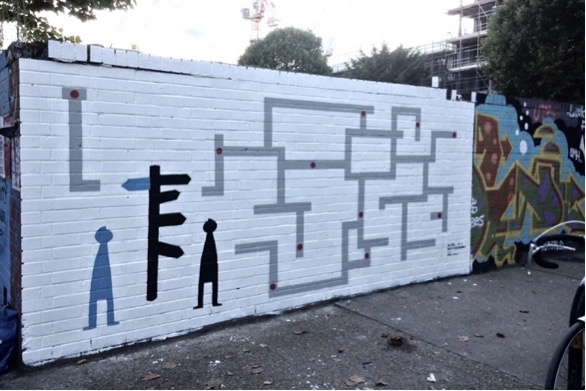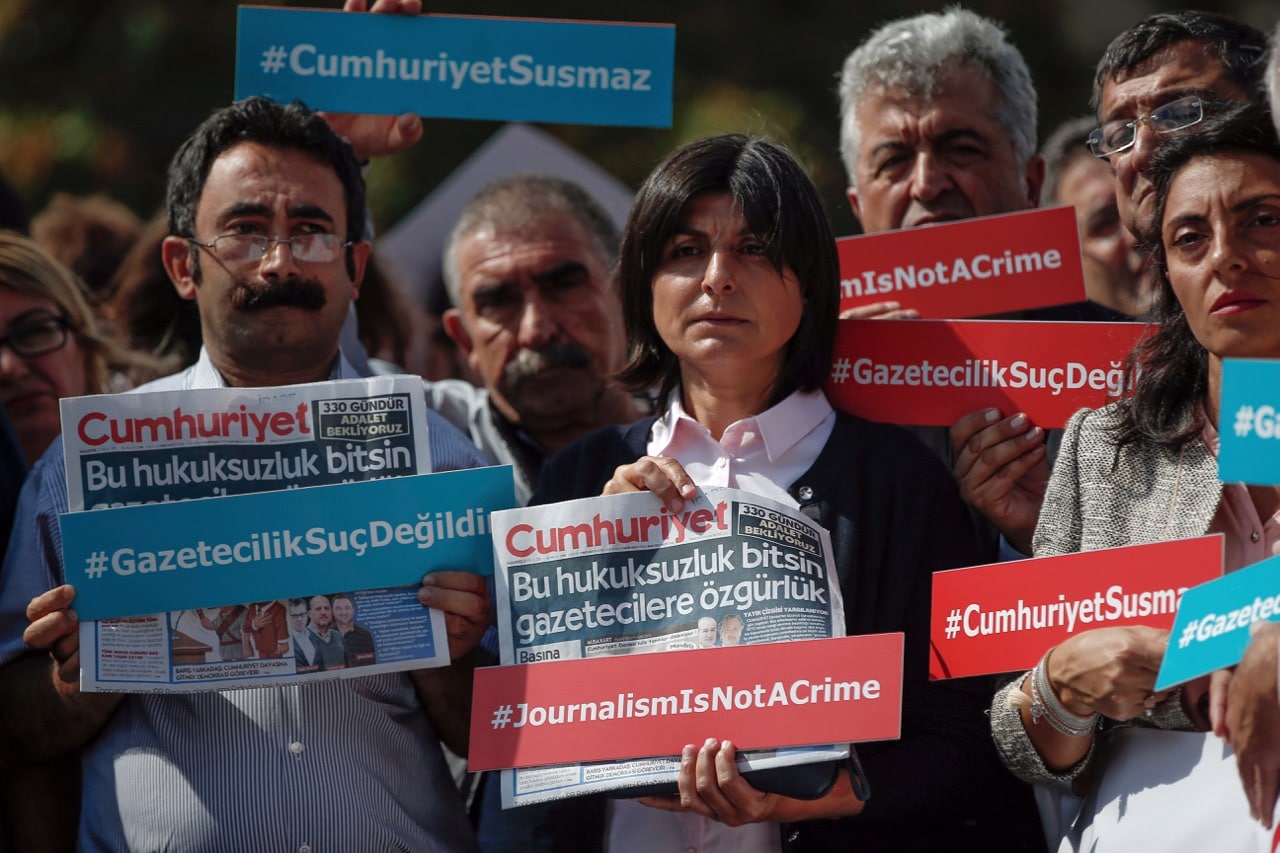A roundup of key free expression news in Europe and Central Asia, based on IFEX member reports.
Turkey
In Turkey, the seemingly never-ending trials, harassments and intimidations of journalists and opposition voices continued unabated. There were important developments in two cases of particular interest to IFEX members…
The third hearing in the trial of the Cumhuriyet journalists (all facing terrorism-related charges) ended in a mixture of disappointment and farce on 25 September: disappointment, because only Kadri Gursel of the five who were still detained was released; farce, because the pro-government Star newspaper published online what was (allegedly) the judge’s interim decision before the judge had apparently made it. This pre-emptive report was quickly deleted, but not before screen shots had been saved and shown around the courtroom, producing confusion and outrage; the judge demanded to be shown the article, which, in any case, turned out to be inaccurate. Whether it was an honest mistake by the newspaper or something more sinister, it backfired badly as the judge then decided to open a criminal case against the Star.
Several IFEX members, including Reporters Without Borders, International Press Institute, Initiative for Freedom of Expression – Turkey and ARTICLE 19, kept us updated via Twitter about developments during this third hearing. The trial will resume on 31 October.
September also saw a disappointing development in the trial of the journalist brothers Ahmet and Mehmet Altan, detained and charged alongside many others with ‘attempting a military takeover’ (during the failed coup of 2016). The judge ruled to keep them in prison while the trial continues. The Platform for Independent Journalism provides an excellent summary of the trials of Turkish journalists; to read more about the Altans’ trial, please visit their website.
Bianet reported that a number of rights and media organisations, including many IFEX members, had their applications granted to be parties in high-profile cases of detained Turkish journalists before the European Court of Human Rights. The organisations are: ARTICLE 19, Association of European Journalists, Committee to Protect Journalists, European Centre for Press and Media Freedom, European Federation of Journalists, Human Rights Watch, Index on Censorship, International Federation of Journalists, International Press Institute, PEN International and Reporters Without Borders.
There was some good news in the middle of the month with the release of the French freelance journalist, Loup Bureau. He was detained on 2 August, charged with ludicrous terrorism-related offences and freed on 15 September.
Good news! Turkey has released French journo Loup Bureau, held on terror charges since July https://t.co/pjSSDpbW7S @bianet_eng @RSF_inter pic.twitter.com/yEnKbUwvSe
— IFEX (@IFEX) September 18, 2017
With criminalisation of encryption a major concern for human rights defenders around the globe, and in Turkey in particular, IFEX and the Association for Progressive Communications raised the issue at the UN Human Rights Council’s (HRC) 36th session. Their action was supported by over 60 rights NGOs from around the world. States are increasingly treating the use of secure communications as a crime, or as evidence of ‘terrorist’ activity – as we have seen in the cases of the IT consultant Ali Gharavi and the non-violence trainer Peter Steudtner, both of whom were detained alongside high profile human rights defenders (HRDs) at a digital security management workshop in Turkey on 5 July 2017.
The submission recommended that the HRC ‘Work with States to ensure the internet is a space that fosters rather than limits the exercise of all recognised human rights; and monitor efforts by member States to restrict or compromise the use of secure digital communications.’ It called on Turkey specifically to ‘drop all charges against Gharavi, Steudtner, and the eight human rights defenders arrested with them; and cease criminalising the use of secure digital communications.’ The full written submission is available here.
Ukraine
PEN International held its 83rd International Congress in Lviv, Ukraine. It used the opportunity to raise a number of key free expression concerns regarding the country’s journalists, and to launch the report Freedom of Expression in Post-Euromaidan Ukraine: External Aggression and Internal Challenges. Two Ukrainian writers/journalists were named as ‘Empty Chairs’ (a PEN tradition whereby arrested or killed colleagues are remembered by PEN members and appropriate calls made for justice). These were the filmmaker and writer Oleg Sentsov (jailed by a Russian court for 20 years on trumped up terrorism charges) and the journalist Pavel Sheremet, murdered in 2016, and whose killers enjoy impunity.
#Ukrainian writer & filmmaker #OlegSentsov introduced as the Empty Chair case for the opening day of the #83PENCongress pic.twitter.com/HlQn9rAOpw
— PEN International (@pen_int) September 19, 2017
The illegal occupation of Crimea by Russia in 2014 and the hot-and-cold conflict between Kiev and pro-Russian separatists in the east of the country have created a threatening environment for journalists, who, at times, find themselves targeted by the Ukrainian authorities, Russia and the separatists. At the end of August, the Russian journalist Anna Kurbatova was reportedly intercepted in Kiev by unknown individuals and deported; around the same time, Spanish freelance journalists Antonio Pampliega and Ángel Sastre were reportedly banned from entering Ukraine for three years over their reporting on the conflict in the east. Alarmed by these events, and others, the Committee to Protect Journalists called on President Poroshenko to reaffirm his commitment to ensuring journalists’ safety. Early in the month, we learned that pro-Russian separatists had reportedly sentenced the Ukrainian blogger, Eduard Nedelyayev, to 14 years’ imprisonment on treason charges; Nedelyayev had written critically about the separatist authorities in his hometown of Luhansk. And on 22 September, a court in Russia-occupied Crimea found RFE/RL contributor Mykola Semena guilty on separatism charges and handed him a 2.5 year suspended sentence.
Focus on gender: the OSCE and UK
The disturbing increase in abuse suffered, both on-and-offline, by women journalists was at the front of a lot of minds this month. The OSCE Representative on Freedom of the Media, Harlem Désir, announced the launch of an OSCE campaign focused on the safety of women journalists.
Stand up for Safety of Female Journalists Online – Join @OSCE_RFoM in our #SOFJO campaign! https://t.co/YPl33IJT0H pic.twitter.com/MWIRok4eDJ
— OSCE media freedom (@OSCE_RFoM) September 21, 2017
Noting that female journalists face a ‘double-burden: being attacked as journalists and as women,’ the campaign warns that ‘in extreme cases, these attacks lead to self-censorship or worse: women retreating from the public sphere, leaving the male-dominated field of journalism with even fewer female voices.’ The OSCE will be ‘organising workshops, designing an online resource portal, and pulling together a network of journalists, academics, members of civil society and policy-makers to come up with innovative strategies to better support journalists who face online abuse, and counter the abuse itself.’
Nasty Women UK held its first UK event over the third weekend in September. Focused on various aspects of women’s experience in arts, the media and elsewhere, the event raised money to support work tackling violence against women. IFEX member Veronica Yates (Director of Child Rights International Network) took part in a panel on ‘Art as Activism’ and, alongside CRIN’s artist Miriam Sugranyes, even painted a mural inspired by the issue of ‘discrimination’:
Protecting journalists: some encouraging developments
On 5 September, IFEX members including ARTICLE 19, Committee to Protect Journalists, International Federation of Journalists, Index on Censorship, International Press Institute, PEN International and Reporters Without Borders joined other media organisations and David Kaye, the UN Special Rapporteur on the promotion and protection of the right to freedom of opinion and expression, at an event organised by the OSCE Media Freedom Representative in Brussels. The focus of the event was to discuss threats to journalists across the OSCE region and explore new ways of working together in order to effectively deal with these threats. (It’s a big challenge: Index’s Mapping Media Freedom project has already registered 571 attacks on media freedom in Europe during the first six months of 2017.) Participants at the meeting pointed to the implementation gap among OSCE participating states in enforcing media freedom and the lack of political willingness to improve the situation as being the main challenges. The intention now is to develop the collaborative work begun in Brussels.
There was very promising news for journalists in the second half of September, when President Macron of France used his first address to the UN General Assembly to call for the creation of a UN representative on journalists’ safety. Lots of credit for this must go to Reporters Without Borders, which has campaigned for this for two years, and to the more than 130 NGOs backing the RSF initiative; many IFEX members have joined a coalition supporting the campaign.
Briefly from Azerbaijan and Kazakhstan
In Azerbaijan, attacks on free expression and other rights continue in the form of arrests, harassment and bogus charges against journalists and independent voices. In late August, Mehman Aliyev, head of the independent Turan Information Agency, was detained on dubious criminal charges relating to alleged tax offences. The Institute for Reporters’ Freedom and Safety (IRFS) stated that the arrest had political motives. Aliyev was released on bail on 11 September, but faces an eight year sentence if found guilty. There was some good news for Alexander Lapshin, the Belarusian-Israeli blogger, who had been sentenced to 3 years’ jail in July 2017 for illegally crossing the border: he was pardoned by the President on the same day that Aliyev was released. IRFS described both releases as a mere ‘first step’ towards addressing the problem of jailed reporters in Azerbaijan and called for all journalists and opposition voices to be freed.
But Azerbaijan is now in serious trouble with the Council of Europe….
The state’s defiance of a 2014 ruling by the European Court of Human Rights that the imprisonment of political activist Ilgar Mammadov was illegal and that he should be freed, was behind a decision taken by the Council of Europe’s Committee of Ministers to trigger legal infringement proceedings against the country. This is a lengthy process, but, as Human Rights Watch explains, could result in Azerbaijan being expelled from the Council of Europe.
In Kazakhstan there was mixed news for the independent journalist Zhanbolat Mamay, who was released from detention this month but banned from working as a journalist for three years. Mamay was detained in February on trumped up money laundering charges and has said that he was beaten and threatened in jail. The OSCE Representative on Freedom of the Media described the ban as ‘a violation of OSCE principles regarding freedom of the media.’

Mural inspired by the issue of “discrimination”Miriam Sugranyes, CRIN
